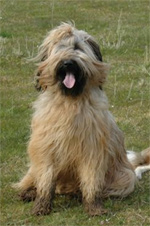There is something positively mesmerising about the sight of a giant hairy fur-ball bounding over clumps of heather in pursuit of a pheasant: it’s difficult to do anything other than stand in wonderment at just how agile 35kg of dog can be. At first, it is fascinating, you can’t help but smile at the sight, but as the shaggy ball recedes into the distance and you realise that it is utterly deaf to your whistles and increasingly frantic calls, the fascination quickly turns into blind panic.
This great hairy lump, who can walk you into the ground and who can certainly out-run you any day, is Out of Control. And heading, with a frightening determination, across the heather towards a main road half a mile away.
Dora is a young Briard who has been with us about 15 months. She has the most wonderful temperament, is the easiest creature in the world to train, we love her to bits and she is the greatest thing to happen in our lives for a very long time but, and it is a very big BUT, she has a switch in her brain which flicks if she sees a rabbit, hare, pheasant, cat, sheep or chicken. With one of these in her field of view, whether twenty feet away or two hundred yards away, we had fractions of a second in which to gain her attention – miss the moment and she was off like a missile, but a missile with no control mechanism. Somehow she would switch off those huge ears, would hear nothing, would totally ignore any command – and though she would eventually return, it would only be when she had lost whatever she was chasing or had come to a fence.
We did not mind so much when we walked her on our own land, we turned a blind eye to her chasing rabbits or hares – it was “good to give her a run” and she would always give up at the fence even if she would not respond while she was actually chasing. However, walking in the lanes around where we live became a different matter for she would pursue wildlife into other peoples fields and though her breed was used in France for herding sheep, her increasing interest in those around us gave us serious cause for concern for it was obvious she wanted to chase, not herd. But the final straw was the pheasant.
With very real visions of her being killed on a road – she has absolutely no road sense – we were faced with having to permanently walk her on a lead. This was just not an option, it would destroy the whole idea of living in the country with a dog and in desperation, we started looked for help.
Walking through Ness Islands, we chanced to meet a man with his dogs. Briards are not common and people frequently stop and talk with us but this conversation was one of those life-changing moments for the man with the dogs turned out to be Mike. We chatted for a while for a while and could not help but see that despite his ultra-low-key approach, this man knew what he was talking about and when he told us who he was and what he did, it was not long before we were scheming. Mike was interested in our problems with Dora and asked us if we would like to walk a while with him so he could observe Dora. True to form when in an unfamiliar place with dogs and ducks all around she was hyper, in a world of her own, constantly looking for whatever was out there, and Mike’s interpretation of this behaviour was a real eye-opener to us.
A short while later Mike came and stayed in our self-catering property on Orkney so that he could work with Dora, or rather with Dora and us. After a week patiently teaching us what was going on inside Dora’s mind – not just with the chasing, but with her other “inclinations” – we had learned a lot about how to develop our relationship with her. We learned how to stimulate her, to give her things to think about instead of letting her just rampage around; we learned how to teach her to treat sheep and rabbits and cats and all the rest as just things which were around her and not things which were there for chasing.
That was two months ago and walks in the country are now a whole new experience: a load has been lifted off our minds. Dora is as keen as ever to go walks yet daily we see her more responsive to commands so we can relax and enjoy the experience. It’s been a very steep learning curve for us but it’s not a quick-fix and the mutual training will go on for some months. But we now have a hugely more rewarding relationship with Dora, and she with us. A rewarding dog, indeed.

